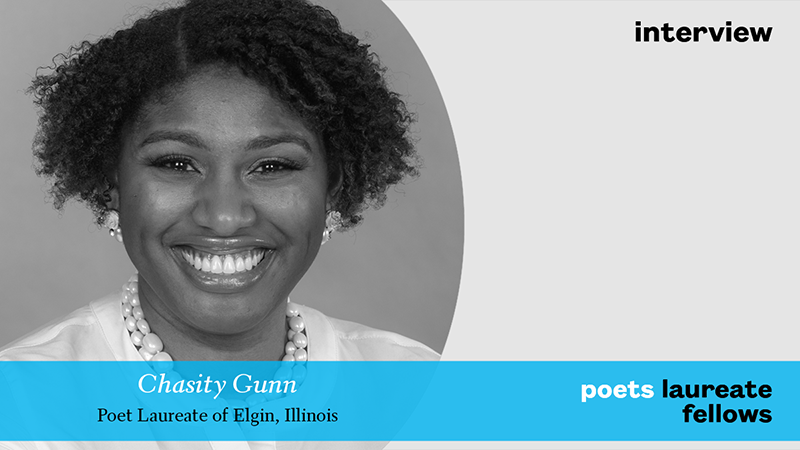
Chasity Gunn, inaugural poet laureate of Elgin, Illinois, is the author of How to Create a World (2018) and an English professor at Elgin Community College. In 2021, Gunn was awarded the Academy of American Poets Poet Laureate Fellowship to support Sanctuary Poets, which is inspired by June Jordan’s “Poetry for the People,” and the poet’s time during her MFA. For six weeks, participants will take part in a weekly poetry seminar. Rather than specifically targeting one demographic, Sanctuary Poets seeks to model the inclusive nature of a sanctuary, where people of various backgrounds gather in a central place. The same group of poets will be in each seminar, so they can form a sense of community. All will be welcome. The seminar will conclude with a poetry reading featuring visual art, a chapbook, and an audiobook of the poets reading their work.
Poets.org: Congratulations on being the inaugural poet of Elgin, Illinois! What do you hope for the future of poetry in Elgin?
CG: I hope that the future of poetry in Elgin is inclusive not simply in word, but in deed. Poetry, like many other art forms, is segregated within a community between the haves and have-nots. The “haves” are often connected to governing bodies with budgets. They are usually racially and socially monolithic. On the other hand, the “have nots” are folks who are grassroots in nature and are often more representative of their community. However, for poetry to be a force in any city, but particularly Elgin, these groups need to collaborate, and the division must cease.
I hope that in the future more seats are added to tables like Cultural Arts Commissions and poet laureate selection committees. These seats need to be filled with strangers rather than people simply inviting their friends. This will cause these groups to be less monolithic and more representative of Elgin.
Poets.org: How can a poet, or poetry, bring a community together?
CG: Poetry is an art form that appeals to people of various ages, socioeconomic backgrounds, ethnicities, genders, etc. Poetry is a prominent art form around the world. Because of this, it can bring a community together. However, to do so, a poet who respects and values inclusivity is necessary to create this environment. When a poetry community is created, it must reflect the community. It’s not enough to be united around poetry; that poetry must be reflective of that community. When that happens, individuals are empowered to share their poetic voice in a collaborative song.
Poets.org: Has being a poet laureate changed your relationship to your own writing in any way?
CG: This role forced me to divorce perfectionism. As a poet, it’s easy to lull over a poem for years or procrastinate writing. However, when you are commissioned to write a specific poem for a specific event at a specific time, you have to leave perfectionism behind. This position forced me to do that. I think I also became more sensitive to sound in my poetry. I often presented poetry in nontraditional spaces, and I wanted the audience to be able to follow my poetry. I thought a lot about how sound could be used to make my poems more accessible to others.
Poets.org: What part of your project are you most excited about?
CG: I am looking forward to reading the chapbook and listening to the audiobook. The poets who participated created beautiful work. I am eager for their work to be shared with the Elgin community.
Poets.org: What obstacles, if any, did you experience when starting your project?
CG: Doing this project in the midst of a global pandemic was a major obstacle. People have become accustomed to being in isolation, and some have experienced fatigue from being behind a screen. Others are fearful of gathering. Overcoming those mental and emotional challenges to attend an in-person writing workshop was difficult for many people. Not everyone who signed up attended a session. That was one of the obstacles I faced.
Poets.org: Sanctuary Poets creates an inclusive space, a community, in which artists of all kinds feel welcome and safe. Art can often fill the gaps between generations and communities. How can art inspire others to listen and teach empathy?
CG: For one of the sessions, I shared a couple of links where poets could read works by Indigenous poets. They were given a window into Indigenous communities and poetic traditions. So much has been stolen from Indigenous communities; however there is much beauty, strength, and wonder that remains. Poetry is an art form that can capture all of those things. It can become a space for participants to grow in their empathy and appreciation of Indigenous poets.
Poets.org: Is there a specific poem on Poets.org that inspires you and your work in the Elgin community, particularly when thinking about creating inclusive spaces for other artists?
CG: What I love about Lucille Clifton’s “won’t you celebrate with me” is that she is inviting others to celebrate with her. She is not celebrating alone or with a select few. Inclusive spaces must be spaces where all folks feel and are welcome and are invited. A place where difference is celebrated and honored. A place where strangers and friends gather. My vision for Sanctuary Poets is to create that type of space in my own community.
